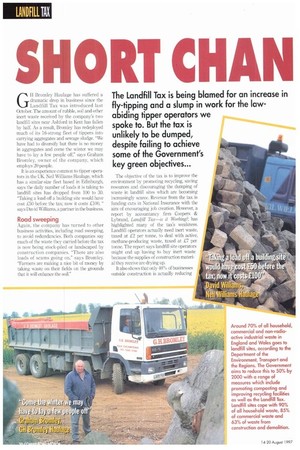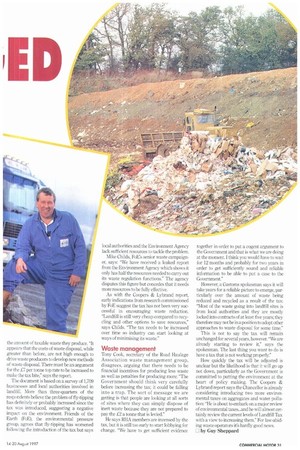SHORT CHAN
Page 42

Page 43

If you've noticed an error in this article please click here to report it so we can fix it.
The Landfill Tax is being blamed for an increase in fly-tipping and a slump in work for the lawabiding tipper operators we spoke to. But the tax is unlikely to be dumped, despite failing to achieve some of the Government's key green objectives...
GII Bromley Haulage has suffered a dramatic drop in business since the Landfill Tax was introduced last October. The amount of rubble, soil and other inert waste received by the company's two landfill sites near Ashford in Kent has fallen by half. As a result, Bromley has redeployed much of its 16-strong fleet of tippers into carrying aggregates and sewage sludge. "We have had to diversify but there is no money in aggregates and come the winter we may have to lay a few people or says Graham Bromley, owner of the company, which employs 20 people.
It is an experience common to tipper operators in the UK. Neil Williams Haulage, which has a similar-size fleet based in Edinburgh, says the daily number of loads it is taking to landfill sites has dropped from 100 to 30. "Taking a load off a building site would have cost £50 before the tax: now it costs £100, " says David Williams, a partner in the business.
Road sweeping Again, the company has turned to other business activities, including mad sweeping, to avoid redundancies. Both companies say much of the waste they carried before the tax is now being stock-piled or landscaped by construction companies. "There are also loads of scams going on," says Bromley. "Farmers are making a nice bit of money by taking waste on their fields on the grounds that it will enhance the soil." The objective of the tax is to improve the environment by promoting recycling, saving resources and discouraging the dumping of waste in landfill sites which are becoming increasingly scarce. Revenue from the tax is funding cuts in National Insurance with the aim of encouraging job creation. However, a report by accountancy firm Coopers & Lybrand, Landfill Tax—is it Working?, has highlighted many of the tax's weakness. Landfill operators actually need inert waste, taxed at .E2 per tonne, to deal with active. methane-producing waste, taxed at I:7 per tonne, The report says landfill site operators might end up having to buy inert waste because the supplies of construction material they receive are drying up.
It also shows that only 40% of businesses outside construction is actually reducing
the amount of taxable waste they produce. "It appears that the costs of waste disposal, while greater than before, are not high enough to drive waste producers to develop new methods of waste disposal. There must be an argument for the £7 per tonne top rate to be increased to make the tax bite," says the report.
The document is based on a survey of 1,709 businesses and local authorities involved in landfill. More than three-quarters of the respondents believe the problem of fly-tipping has definitely or probably increased since the tax was introduced, suggesting a negative impact on the environment. Friends of the Earth (FoE), the environmental pressure group, agrees that fly-tipping has worsened following the introduction of the tax but says local authorities and the Environment Agency lack sufficient resources to tickle the problem.
Mike Childs, FoE's senior waste campaigner, says: "We have received a leaked report from the Environment Agency which shows it only has half the resources needed to carry out its waste regulation functions." The agency disputes this figure but concedes that it needs more resources to be fully effective.
As with the Coopers & Lybrand report, early indications from research commissioned by FoE suggest the tax has not been very successful in encouraging waste reduction. "Landfill is still very cheap compared to recycling and other options to save resources," says Childs. "The tax needs to be increased over time so industry can start looking at ways of minimising its waste."
Waste management Tony Cook, secretary of the Road Haulage Association waste management group, disagrees, arguing that there needs to be financial incentives for producing less waste as well as penalties for producing more: "The Government should think very carefully before increasing the tax; it could be falling into a trap. The sort of message we are getting is that people are looking at all sorts of sites where they can simply dispose of inert waste because they are not prepared to pay the ,£2 a tonne that is levied."
He says RIIA members are incensed by the tax, but it is still too early to start lobbying for change. "We have to get sufficient evidence together in order to put a cogent argument to the Government and that is what we are doing at the moment. I think you would have to wait for 12 months and probably for two )rears in order to get sufficiently sound and reliable information to be able to put a case to the Government."
However, a Customs spokesman says it will take years for a reliable picture to emerge, particularly over the amount of waste being reduced and recycled as a result of the tax: "Most of the waste going into landfill sites is from local authorities and they are mostly locked into contracts of at least five years; they therefore may not be in a position to adopt other approaches to waste disposal for some time."
This is not to say the tax will remain unchanged for several years, however. "We are already starting to review it," says the spokesman. The last thing you want to do is have a tax that is not working properly."
How quickly the tax will be adjusted is unclear but the likelihood is that it will go up not down, particularly as the Government is committed to putting the environment at the heart of policy making. The Coopers & Lybrand report says the Chancellor is already considering introducing two more environmental taxes on aggregates and water pollution: "He is about to embark on a major review of environmental taxes...and he will almost certainly review the current levels of Landfill Tax with a view to increasing them." For law-abiding waste operators it's hardly good news.
LI by Guy Sheppard
















































































































